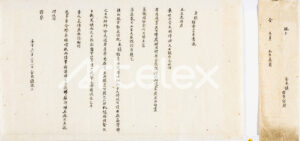Kim Dong-jin (1867–1952) was a Korean independence activist who was arrested in 1914 for his involvement in the Korean Independence Army Headquarters (Daehan Dongnip Uigunbu), a secret organization founded by Lim Byeong-chan (1851–1916) dedicated to the independence movement. In March 1919, he signed a petition for independence as part of the Confucian scholars’ independence movement (Yurimdan), and in 1925, he became involved in a fundraising effort led by Kim Chang-suk (1879–1962) to support military activities. As a result, he was implicated in the so-called Second Yurimdan Uprising and served time in Daegu Prison in May 1926.
Kim hailed from the Seonseong Kim clan, with the courtesy name Gukgyeong and the pen names Jeongsan or Seokpo. He was born on January 8, 1867, in Sangseok-ri, Buseok-myeon, Yeongju City, to father Kim Heon-gyu and mother of the Andong Gwon clan. In 1884, he studied under Gwon Yeon-ha (1813–1896) in Bonghwa, and later, under the recommendation of Gwon, he furthered his studies with Kim Heung-rak (1827–1899) in Seosan.
In 1912, during his involvement with the Korean Independence Army Headquarters, Kim was arrested for activities related to raising funds for the independence army and establishing domestic and international networks. In 1919, he participated in the Paris Petition Movement, led by Gwak Jong-seok (1846–1919), Jang Seok-yeong (1851–1929), and Kim Chang-suk, signing a petition for independence, also known as the “Paris Declaration.” His involvement in this movement led to his arrest and imprisonment for over 40 days, during which he endured severe torture.
In 1925, Kim Chang-suk secretly returned to Korea to raise 200,000 won for the construction of an independence army base in Inner Mongolia, and Kim Dong-jin actively supported this effort, even involving his son in the fundraising. However, in April 1926, a large-scale crackdown began with the arrest of key figures such as Kim Hwa-sik (1902–1950), leading to the arrest of over 600 people involved in the so-called Second Yurimdan Uprising. Kim Dong-jin was among those arrested and indicted for violating “Imperial Ordinance No. 7 of Taisho Year 8” and the Peace Preservation Law, serving time in Daegu Prison before being released after about a month.
Kim Dong-jin passed away on December 22, 1952, at his home in Sangseok-ri, Buseok-myeon, Yeongju City.

